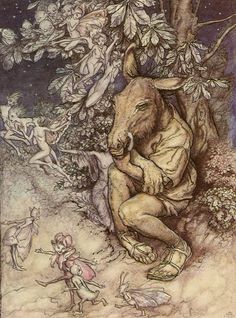As my oldest daughter starts “officially” learning Romeo and Juliet this month at school, it’s been a fascinating adventure in seeing just how prepared she is. We own a version with gnomes, and a version with seals. Whenever the Leo DiCaprio version is on tv I tend to put it on and proclaim, “This is the best part!” and let the kids watch until my wife comes in, sees how violent it is, and suggests that it’s maybe not appropriate. I’ve got graphic novels and pop-up Globe Theatres and finger puppets and action figures and if you’ve been a long time reader of the blog you know that my kids have grown up, by design, surrounded by Shakespeare.
All she needs do now is actually open up the text and read the thing, because she’s never done that. Also, by design.
I am a huge, huge proponent of reading the plays. Every time the subject comes up and people rush to the “The plays were meant to be performed, not read!” side of the room I stand squarely on the opposite side to defend the value of the text. You can see a dozen or a hundred performances of Romeo and Juliet and all you’ll ever have at the end of the day is someone else’s interpretation. But don’t get me started.
I’m aware that the text can be intimidating. It’s easy to say “The Capulets and Montagues hate each other, and the play opens with a big fight scene.” Then you turn the page and see
SAMPSON
Gregory, o’ my word, we’ll not carry coals.
GREGORY
No, for then we should be colliers.
SAMPSON
I mean, an we be in choler, we’ll draw.
GREGORY
Ay, while you live, draw your neck out o’ the collar.
SAMPSON
I strike quickly, being moved.
GREGORY
But thou art not quickly moved to strike.
And if you’re a typical middle school student you’re going to be lost already. As was my daughter. In preparation I’d given her the Spark Notes version of the play, because it’s the kind of thing I happen to have lying around the house. I chose that one because it would have glossary information right there on the page. But she was already doing that thing I worry about, where every individual word became a hunt through the glossary. Trees, forest. The big picture is quickly lost.
My theory has always been that if you learn everything else about the play except the text, that the text will come easily. I think that perhaps I’ve been mistaken. I have expected it to come easily because it comes easily to me. I no longer remember what it’s like to see the text for the first time. It’s impossible to get “The play opens with a fight” from the clip above. Sure, eventually you get to “I will bite my thumb at them, which is a disgrace to them that bear it.” You can start to figure out what’s going on by then – but that’s a dozen or so lines in. How do you tell a student “Skip that part and get to the good stuff?” How do they know which parts to fast forward?
To be continued …




